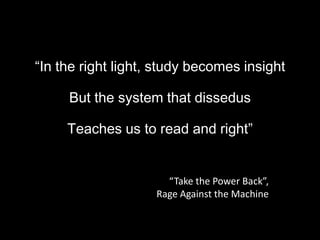
Theories 6 21
- 1. “In the right light, study becomes insight But the system that dissedus Teaches us to read and right” “Take the Power Back”, Rage Against the Machine
- 2. The Impact of Culture on Learning Exploring the Theories of Jeff Duncan-Andrade and Lev Vygotsky
- 3. Jeff Duncan-Andrade and Lev. S. Vygotsky lived nearly 100 years apart. The former writes and works within the hip-hop culture of mostly urban youth in California while the latter toiled in the oppressive confines of Stalinist Russia. Yet these two constructivist thinkers shared ideas about the social and cultural contexts of learning. These ideas offer alternatives to the traditional pedagogies in our rapidly changing world.
- 4. How is Learning Defined?
- 5. Educator/theorist Jeffrey Duncan-Andrade makes a case that learning is a participatory activity in which students are critical contributors to their own development. For Duncan-Andrade, learning begins within the social and cultural experiences inherent in each student’s world.
- 6. For Duncan-Andrade, learning equals empowerment, and creates opportunities for students to become “agents of critical awareness and social change.” He believes that popular youth culture, or the various activities in which young people invest their time, must be considered in any authentic and effective pedagogy.
- 7. Russian psychologist Lev S. Vygotsky defined learning as the result of social interaction. “Social relations and the culture from which the social interaction is defined helped to form a child’s cognitive functioning.” (Goodman, p.26) Learning is the end product of socialization and social behavior. For Vygotsky, learning proceeds development.
- 8. Vygotsky believed that the most critical learning stage was the period between what a child already knows, and what they are capable of knowing/learning with guidance from a parent, teacher or more accomplished peer. This stage is know as the Zone of Proximal Development (ZPD).
- 9. What is the role of teacher/educator?
- 10. According to Duncan-Andrade, teachers should maintain the role of instructional leader but without retaining the concentration of power. Distributing the power over what and how students learn leads to “authentic caring” Valenzuela (1999) where the classroom draws from the culture of the students themselves instead of what is prescribed by the dominant culture.
- 11. Duncan-Andrade believes that when youth popular culture is incorporated into the classroom, the teacher/educator can guide their students to think more critically about what they already know--the media, music, language, style contexts of their world-- then apply those critical thinking skills to the larger world.
- 12. Vygotsky believed the teacher/educator was not a “depositor of knowledge to students” (Freire, 1970) but a collaborator in a learning process. He viewed this process as a dialog between teacher and student and the process itself as important as the task being taught. An important ingredient in this process was the concept of “scaffolding” where the teacher gradually decreased the amount of support as the student assumed more confidence and understanding.
- 13. Vygotsky viewed the relationship between teacher and student as a partnership where dialog and social interaction guides the students toward mastery. Once the educator guides the student through the ZPD, the student is capable of taking that knowledge and applying it elsewhere.
- 14. What is the role of student/learner?
- 15. Duncan-Andrade views students/learners as producers in a dynamic learning process, rather than recipients of static force fed knowledge. He believes that when students are given opportunities to make meaning of their own world through their popular culture, they can learn to think critically and apply that thinking to other cultures, concepts and inequities.
- 16. Vygotsky also believed that the student/learner was an active participant in the learning process. He believed that students do not learn in isolation but within the social and cultural contexts that make up their daily lives. He believed that students acquired language, memory, and reasoning skills in every social experience, whether it was teacher/student, family/child or peer to peer.
- 17. What do Duncan-Andrade and Vygotsky have to do with schooling today?
- 18. Duncan-Andrade and Vygotsky are relevant in discussions about schooling today because they both take into account the social and cultural environments within which students live and learn. Both scholars believe that learning takes place as a result of these socio-cultural experiences and in many different forms: discourse, music, media etc.
- 19. If learning takes place as a result of these social and cultural interactions, then how or if schools take advantage of these learning opportunities is crucial. It is crucial because now more than ever, we live in a socially connected, though culturally diverse world.
- 20. Through technology, music, and media, students are presented with non-stop opportunities to think about their world and the bigger, connected world around them. I believe both Duncan-Andrade and Vygotsky would urge schools to utilize these opportunities to teach our students to make decisions, ask questions, defend opinions, right injustices, formulate solutions.